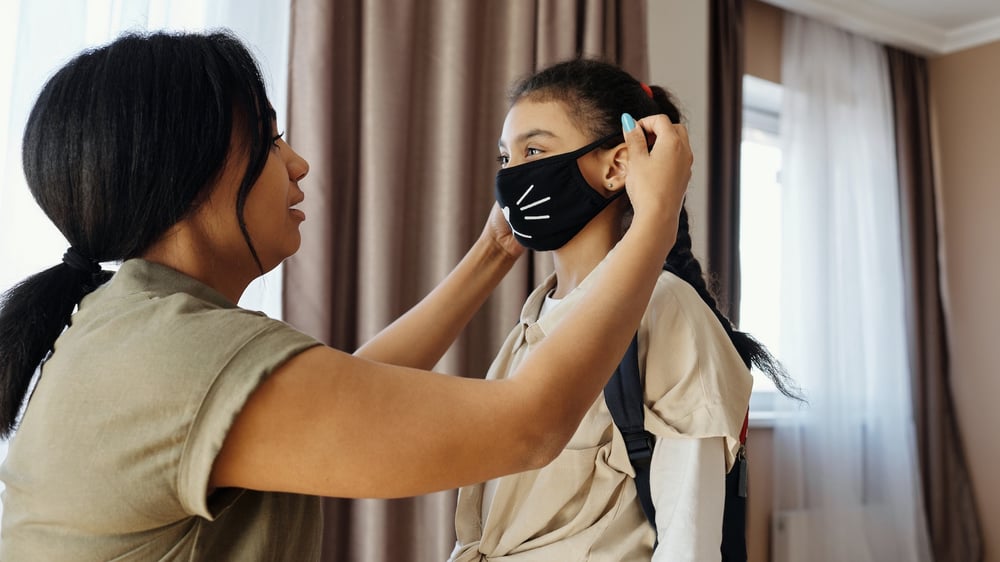
Anyone with children who have been involved with choirs in the community or at school knows that COVID-19 has had some significant impacts on these youth. As COVID-19 restrictions continue to be reduced and mask mandates relaxed, many of us, including young people, want to know what life will be like when it’s time to return to some of the activities we did before quarantines and lockdowns.
Even if your youth choir has been doing virtual projects and singing over zoom, getting back into the rehearsal room in person might be exciting and daunting for many young people. Not only will they be surrounded by a significant number of people, but just the act of singing with others could be exciting, scary, and potentially overwhelming.
The thought that a young choir member might be stressed about returning to something they enjoy could pose some questions for parents and choir directors both. What are the potential negative and positive side effects for these young singers, and how do we help them recover from the stressors that have occurred over the last year?
The Potential Impact of COVID-19 on Young Singers
Many young singers struggle during their first years in a normal choir setting, whether at school or in the community. Not only are their ears and voice developing, but they are learning how to interact socially, gaining confidence in who they are as a human being, and watching every move of the people around them to determine how they should act in various life situations. Other potential difficulties with youth involved in choir include stage fright, bullying, and overcoming natural obstacles like puberty.
When you put all of these things together alongside COVID-19, it is astounding to think about what going back to a rehearsal routine might look like once the restrictions are relaxed. Instead of having control over whether they show their face on Zoom or rehearse in their pajamas, now they must go back to face their peers, adults, and their personal musical sound in a live space.
Depending on your location in the world, you may find that your young singer hasn’t stepped foot in a rehearsal hall or performing space in more than a year! Imagine how that would feel to someone who is learning how to maintain their confidence, control their voice, and develop their social skills. For some kids, going back to live choir rehearsals might feel like their first day at a new school where they have to make new friends and learn their way around an unfamiliar setting.
The Good News: Going Back to Choir Can Help
While all of these obstacles can seem challenging, the good news is that sometimes going back and doing something “normal” like we did before the pandemic can be a huge help. Young people returning to live choir rehearsals may be excited about seeing friends they haven’t met with in a while, getting high fives or hugs from a neighbor, and singing next to someone who boosts their confidence and gives them the energy to sing again.
Other perks of returning to in-person rehearsals include the wonderful healing that comes from singing with others, and over time individual voices will improve, which ultimately strengthens the choir as a whole. Some young singers may even rediscover their love of singing and why they enjoyed being in a choral ensemble to begin with!
Things to Discuss With Your Young Singers
Whether you are the parent of a young choir member or a director getting ready to have your choir members sit together in rehearsal for the first time in a long time, there are some important things to talk about to ensure a smoother transition from COVID restrictions to a more relaxed environment.
Firstly, ask your young choir members their thoughts and feelings about going back to rehearsals and live performances. Wait for them to express themselves on the matter before you decide how you want to proceed. Some singers may feel totally fine going back, others may have anxieties, and some may have feelings that change by the day! The best thing to do is encourage them to ask questions and talk through their concerns before rehearsal day.
Secondly, be prepared to decompress and discuss events and conversations after the first in-person rehearsal has occurred. There could be excitement, new anxieties, or fresh questions they didn’t think of before going back to singing in person.
Finally, stay positive! Remember, young singers will take their cues from the other children and adults in their lives, so your response can make all the difference to ensure they feel calm and confident about singing in person again.
In Conclusion
Ultimately, the only thing to do is go back to in-person rehearsals with concern for the wellbeing of your young singers and the adults in their lives. What are some conversations starters you plan to use with your young choir members when they are ready to go back to live rehearsals and performances? Leave your ideas in the comments!

Amanda Carroll is a former middle school chorus and general music teacher in North Carolina. She is a member of Carolina Style Chorus and Sweet Adelines International and is a non-performing member of Womansong of Asheville. She has Master of Music and Master of Public Administration degrees from Appalachian State University. Her background includes singing with large and small ensembles, as well as solo work and teaching private lessons. Amanda is passionate about creating meaningful concerts and connecting with the community through performance.

